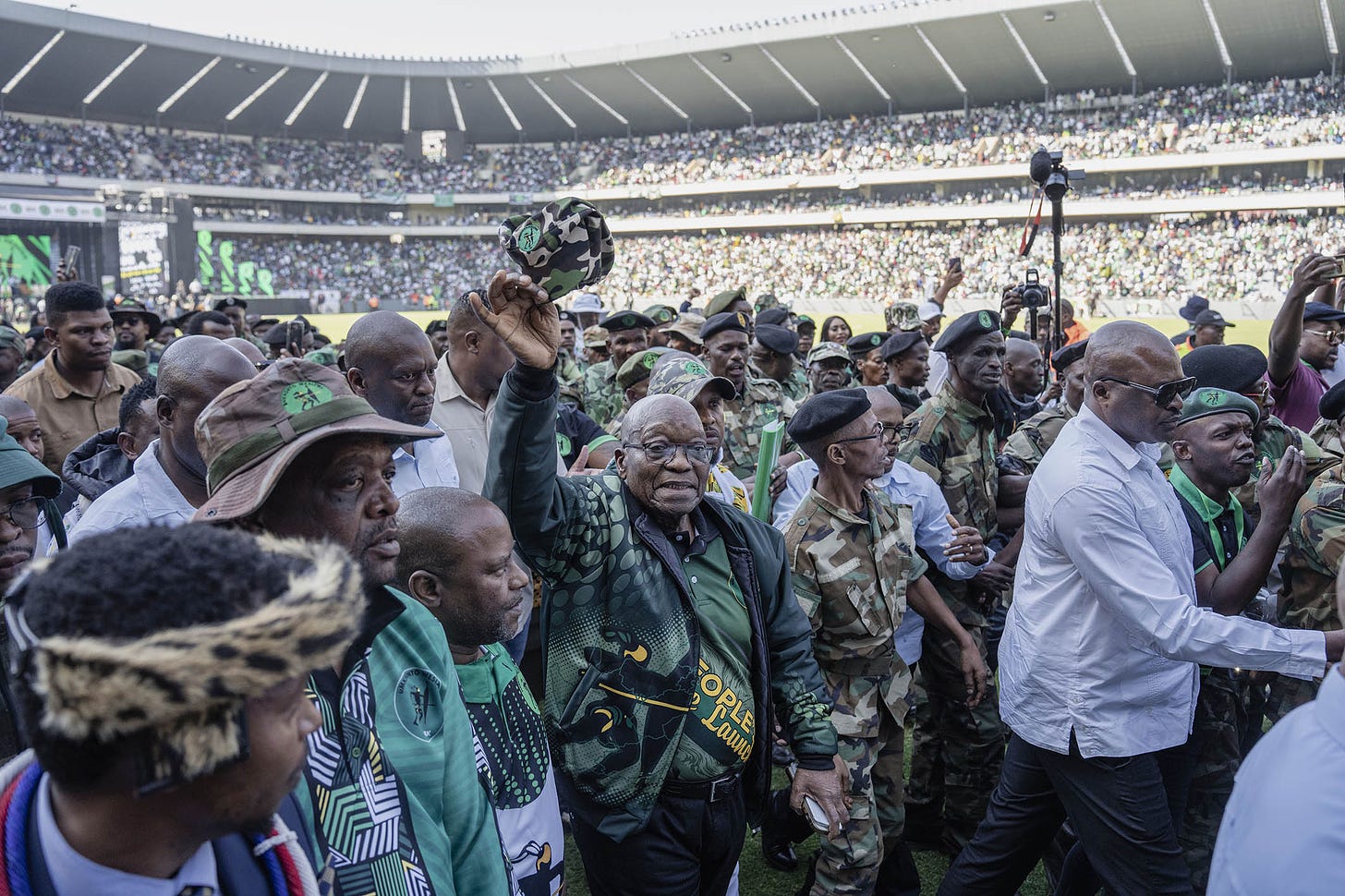Zuma’s revenge
The former South African leader won’t be president again – but he could still decide this election.
Andile Zulu

The biggest shock of this electoral season was former president Jacob Zuma’s announcement that he was running for political office again – but not on the ticket of the African National Congress, which he served during the antiapartheid struggle and then as president for two terms. Instead, Zuma is leading a brand-new, upstart party called uMkhonto weSizwe, which controversially takes its name (which translates as “Spear of the Nation”) from the ANC’s armed wing during the struggle.
The new party is polling extremely well, attracting around 13% of the vote in some predictions, which would make it the third-largest opposition group in the country. Zuma’s past, however, may finally have caught up with him.
The former president of South Africa was this week barred from running for Parliament by the Constitutional Court, due to a previous criminal conviction. As the president is chosen from among members of Parliament, this means he can’t be president either.
The judgment came as a relief to his critics, who view him as a corrupt, lawless and destabilising force in South African politics.
That criminal conviction, handed down in 2021 by the same court, is a good example of what those critics are worried about. It came after Zuma repeatedly refused to testify before an official inquiry into widespread corruption – “state capture”, as South Africans call it – that happened while he was president.
He was supposed to serve 15 months in prison, but was released on medical parole after a few days behind bars. While he was in jail, there were deadly riots in parts of KwaZulu-Natal and Gauteng, leaving more than 350 people dead and causing 50-billion rands ($2.7-billion) in damage to the economy.
But despite his history of personal scandals and his disastrous tenure as president of the republic – which ended when the ruling party recalled him in 2017 – Zuma remains an enormously popular figure in some parts of the country.
There are three reasons for this.
First, the failures of his successor, Cyril Ramaphosa. When Ramaphosa succeeded Zuma, he promised to usher in a “new dawn” – eradicating corruption, reducing unemployment and ending the energy crisis. But that new dawn never arrived. Instead, under Ramaphosa’s neoliberal policies – including austerity measures that have slashed government spending on public goods and social services – the economy has stagnated, in the short term, at least. Zuma, on the other hand, promises radical transformation in the name of the economically marginalised and politically neglected majority. It is a compelling campaign pitch, even if Zuma’s own time in government did little to advance that agenda.
Second, Zuma is the most adaptable and strategic – not to mention Machiavellian – politician in South Africa today. He has a gift for discrediting his opponents and adopting populist talking points, always presenting himself as leading the political struggle against the economic elites who have frustrated South Africa’s attempts to redress the toxic legacies of apartheid.
No matter that, all too often, this populism is hollow: just take his signature “radical economic transformation” policy, announced during his second term in office, which was neither radical nor transformative – unless you were within Zuma’s extensive patronage network.
Finally, Zuma excels at portraying himself as an anti-establishment figure who is unjustly persecuted by white capitalists and black sell-outs.
Zuma merges this narrative with appeals to Zulu nationalism. He is proud of his own Zulu identity, and uses this to appeal to the substantial numbers of Zulu people who feel that KwaZulu-Natal, their ancestral home, has been severely neglected by the ruling party. This appeal to Zulu culture, at times militaristic and chauvinistic, can translate into a significant number of votes.
It is these votes that keep Zuma relevant. With the ruling party likely to need to form a coalition to stay in power, MK’s large projected share of the vote makes it a potential partner, and Zuma a potential kingmaker. But what price would he demand for his support – and what would it cost the country?



